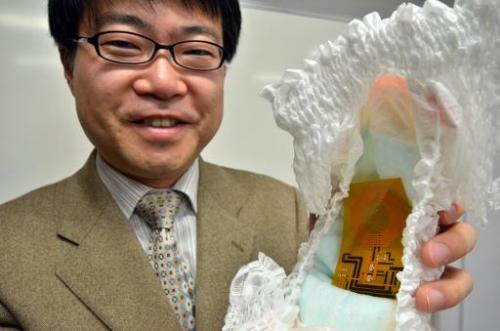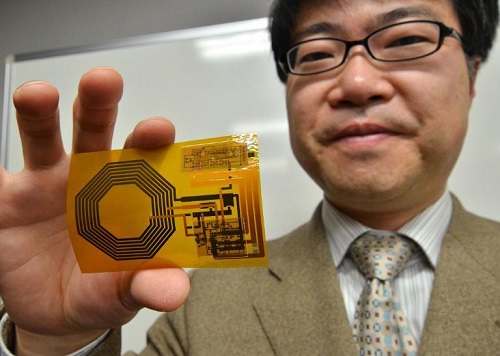Japan is a thriving realm of high-tech innovation, piquing the curiosity of many foreigners with its human-like androids, giant robots, and one must not forget, heaps of niche gadgets fulfilling any role from covertly scratching your butt in public, to recently, detecting when your baby or elderly relative has soiled themselves. Professor Takayasu Sakurai and Takao Someya at the University of Tokyo have just announced the world’s first wireless, organic poop sensor for diapers.

The sensor, made from a flexible, integrated circuit printed on a single plastic film, wirelessly transmits and receives both power and information, allowing a convenient pairing with mobile devices. So instead of visually inspecting the diapers for the color change associated with defection, users will receive a text message – “you got poop.” Lame jokes aside, this is pretty damn convenient if I do say so myself.
Before writing this approach off as the useless aspiration of life-long, childless bachelors, consider the following: nurses have no way of knowing when newborns have soiled themselves unless they check, but because there are so many newborns in the maternity ward, the infants are ordinarily check en masse after specific intervals of time.
The same situation applies to elderly nursing home residents: an enfeebled patient is forced to wallow in filth waiting for the nurses to conduct their rounds if unable to alert them. This depressing prospect causes two subsequent issues: a long delay makes it harder to clean the patient and causes sores. But a wireless notification system eliminates both. “If sensing is done electronically, you can tell simply by coming close to the wearer—without unclothing him or her,” says Someya.
The circuits can be potentially manufactured for the price of a few Japanese Yen (US cents) using inkjet technology and organic material that prevents harming the skin. Someya adds “[the] technology could also be put directly on the skin like a plaster, in place of often ring-shaped devices currently used in hospitals to monitor pulse and blood oxygen levels.”

Current healthcare sensors are fabricated from silicon and other reasonably rigid materials that potentially cause discomfort. By contrast, Someya and Sakurai’s organic circuit provides enough flexibility to ensure comfort, but more importantly, increases the surface area onto which it can be applied. This second factor enhances the amount of monitoring that doctors can administer when coupled with the circuit’s ability to detect wetness, pressure, temperature and changes in electrical resistance.
There are still a few kinks the researchers need to iron out of the prototype, namely, the limitation placed on detection range; a data-reading device needs to be within a few centimeters from the sensor. Someya also wants to further refine power consumption before moving past the prototype phase.
Story via Phys.org
Advertisement
Learn more about Electronic Products Magazine





